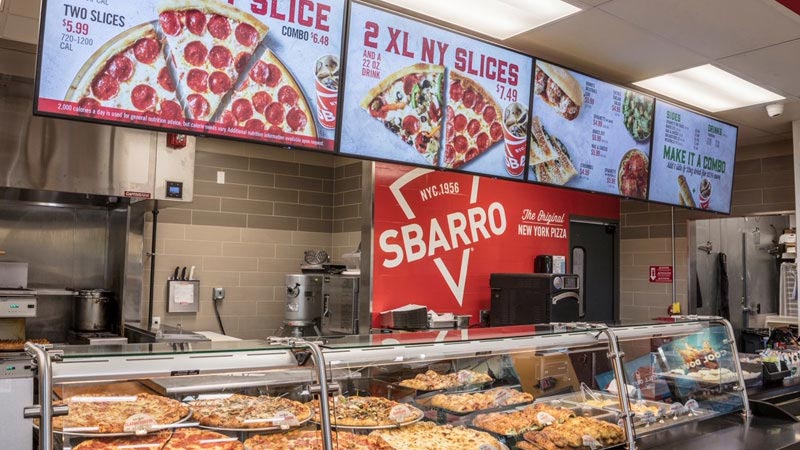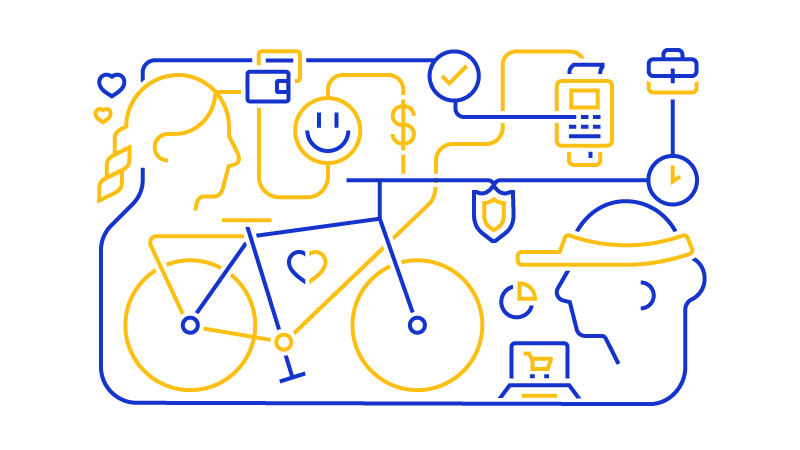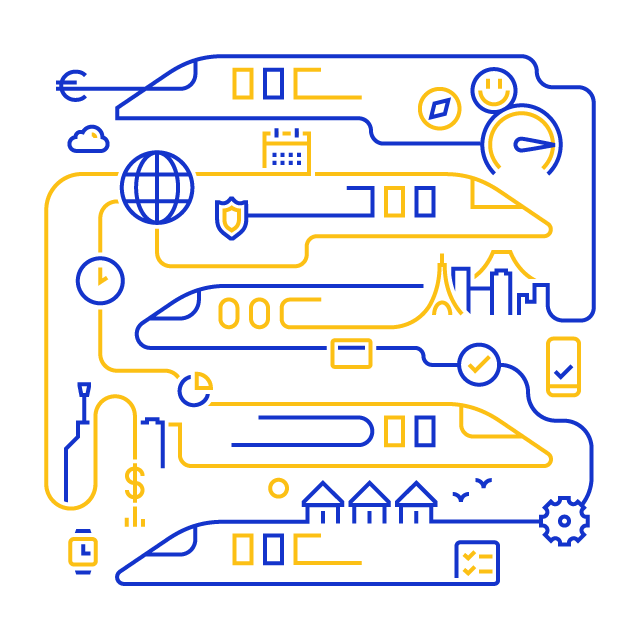The payment revolution
According to the Bureau of Labor Statistics, nearly half of Americans are paid on a biweekly schedule, an outdated routine that was born nearly 80 years ago when the US government needed a way to efficiently collect payroll taxes. That process was automated long ago, but the lagged schedule for getting people paid has remained. It’s not just the US that deals with delayed payment routines either: Countries from Japan to France to Kenya deal with monthly pay cycles, so that workers are often left to budget 30 days’ worth of expenses with one paycheck.
A new generation of companies has forced the world to reckon with those outdated cycles, though. The rise of on-demand work has accelerated the momentum for on-demand worker payments, with global tech powerhouses paying people on a schedule that works best for them. In fact, Upwork partnered with Visa Direct to shorten their payout wait time from 3-to-5 days down to 30 minutes or less using a direct-to-card payout solution¹.
The shockwaves from that evolution are being felt throughout the wider economy, and workers are increasingly able to access funds¹ the minute they’ve earned it—whether they’re driving for a gig company or running their own creative business on a freelance platform. Ushering in that new paradigm won’t be easy, but global players from fast food franchises to big box retailers² are joining the on-demand payment revolution for their hourly workers and giving the movement a jolt of momentum.
“It’s expensive to be poor in America, it’s a horrific cycle,” says Ann Karns, the Team Lead for Enterprise Partnerships at DailyPay, an on-demand payments platform that lets workers withdraw their earned wages before payday. Before joining DailyPay, Ms. Karns was the VP of Human Resources at the restaurant chain Captain D’s where she oversaw the implementation of DailyPay across the company’s hundreds of locations. She saw the impact that the technology had on workers, and became an evangelist for the potency of financial empowerment.
“The issue is that many hourly employees don't have any buffer. You get a flat tire and your world is rocked for several weeks until you can figure that out. Your child needs a prescription that you weren't planning on. There's no room for error. Giving them a way to access the income that they need at a specific time changes that,” she says.
But wanting to join in that march toward a more equitable financial system is one thing—building it is another. Visa Direct is playing a vital role in helping create the infrastructure necessary for workers and businesses to thrive in an increasingly connected global economy. By providing everything from real-time³ payments in more than 160 currencies to the ability to reach billions of payment endpoints around the world, Visa Direct is powering the on-demand financial system one payout at a time.
A slice of freedom

When Gennaro and Carmela Sbarro first came to Brooklyn from Naples, Italy in the 1950’s, they wanted to bring a little of the old country with them. So, they opened an Italian grocery store in the Italian-American enclave of Bensonhurst and, naturally, called it Sbarro’s. The fresh meats and cheeses, sandwiches, pastas and other Italian delicacies sold well enough for them to move into the King’s Plaza Mall where the Sbarro pizza by the slice made its debut.
There are now nearly 350 Sbarro restaurants spread across the country in malls, airports, travel centers, casinos and convenience stores, and nearly 650 Sbarro locations worldwide. And while the food they make is unapologetically old school, the company is financially empowering their employees with technology like on-demand payments.
“People's lives have changed since the bi-weekly pay period was set up and there's different needs that come at different times. Workers should be able to do what they want with their money, when they want,” says Rohan Shearer, SVP and Chief Administrative Officer at Sbarro. The company recently partnered with DailyPay to give Sbarro’s American workforce the ability to access wages they’ve already earned, and Shearer has already seen the transformative potential of this new wave of financial empowerment.
“One of our employees used the app to pay a bill which fell in between our biweekly pay days. Another used it to get some extra cash for the week for coffee and gas. And then another really wanted to go to a concert and they were afraid that the tickets would sell out by the time payday came,” he says. “I love that people are thinking about ways to use this benefit that fit into their lifestyle.”

We partner with Visa to help support these life-changing benefits because they’re the most reliable and dependable network you could ask to work with.
— Jeanniey Walden, Global Chief Innovation and Marketing Officer, DailyPay
According to Mr. Shearer, the early returns on financially empowering their workforce have been encouraging, with 50% of the employees at company-owned outlets enrolling in the program during the initial rollout. The transparency into what workers have earned during a given cycle has also impressed Mr. Shearer, who says that just being able to see the amount that’s available for withdrawal has given staff more control over their financial lives.
But it’s not just the people behind the counter that have seen the power of on-demand payments. “We see the connection to recruitment and retention with employees that have a benefit like DailyPay,” say Mr. Shearer. “And the way that it works is basically zero cost to the employer. There aren’t a lot of benefits these days that can offer those advantages without costing something.”
Empowering any day to be a payday

So how exactly does DailyPay work? Put simply, the platform lets workers withdraw money they’ve earned in between pay periods, empowering them to take ownership of their financial life without waiting for the 1st and the 15th. And by working with Visa Direct through their financial institution, they’re able to provide millions of workers the power of choice and control over their earned pay by taking advantage of Visa’s industry-leading financial network.
“The technology exists to get you access to it as you earn it and as you need it. Why is it that you have to wait two weeks to get access to your money? There are these rules that people have been following for years that really don't need to exist anymore,” says Jeanniey Walden, Global Chief Innovation & Marketing Officer at DailyPay. Walden calls those outdated edicts “invisible rules” that create unnecessary financial barriers for workers and businesses. DailyPay is attempting to rewrite those rules by getting money into the hands of employees quickly while simultaneously helping businesses attract and retain labor. “DailyPay’s mission is really aimed at looking at the entire financial system and shattering these invisible rules around money,” Ms. Walden says.
Getting paid with more flexibility may not seem like a revolutionary development on its own, but Walden points to the fact that costs don’t adhere to a biweekly schedule. Cars break down, utility bills come due, school expenses pop up. In short, life happens in the time between paychecks. “For the people living paycheck to paycheck, not being able to access money can snowball,” says Ms. Walden. “We’re putting money back in people's pockets that they would otherwise spend on late fees, overdraft fees, high credit card interest fees, and predatory payday loans.”
But DailyPay isn’t just empowering workers who need emergency access to money, they’re also helping workers use their money when they want to for everything from concert tickets and vacations to new educational opportunities. That means that workers are empowered to make their own decisions with their own money on their own schedules, rather than waiting around for an arbitrary payday.

It is about helping to break the cycle of negative financial outcomes and building better futures with the money they have already earned.
— Jason Tinder, Head of Marketing, TabaPay
On-demand payments can also open doors for those who are looking to advance their careers and build their skillset, and Walden has seen DailyPay users apply their on-demand payouts to tuition or certification programs, helping them go from hourly wage jobs to build thriving careers. Helping people make those sorts of leaps requires a lot of trust, though. Workers need to know that when they request a cash out, it’s going exactly where they need it to—which is why DailyPay working with Visa Direct is a vital connective point. “We partner with Visa through our financial institution to help power and support these life-changing benefits like on-demand pay because they're the most reliable and dependable network that you could ask to work with,” says Ms. Walden. “It’s a sense of trust and helps people understand and appreciate that if they're using our service, it's going to be a high-quality experience.”
Employers are also seeing the benefits of a more flexible, on-demand financial system. DailyPay’s customers range from large enterprises to small business owners, and they’ve seen a marked improvement in worker retention and sentiment⁴. DailyPay also gives workers on-demand insight into their earnings which provides an often overlooked benefit: Transparency. Telling workers exactly what they’ve earned and how much they can cash out takes away an unnecessary layer of obfuscation, and can give workers the information—or motivation—they need to make a decision on whether to pick up another shift or gig.
Getting faster access to funds so that you can pay a bill, buy food, put gas in your car – it’s really important.
— Mike West, VP and Head of Global Commercialization, Visa Direct
And, crucially, when businesses financially empower their workers, those employees stick around longer helping to save money on training and recruitment. “We have clients that are saving⁵ a significant amount of money every month on recruiting, training, and onboarding,” says Ms. Walden. “It truly has a significant impact on the bottom line.”
The rules of financial empowerment are changing. By moving businesses and employees beyond the outdated two-week payment cycle, DailyPay is ushering in a financial system that empowers workers who need money on their schedules. “We’re trying to shatter these invisible rules around money,” she says. “We want a financial system that starts working the minute that work starts.”
The need for speed

The apps and platforms providing financial empowerment to workers can’t do it alone, though. They need to have a new, stable and secure architecture that allows money to flow from employers to their employees, a vital role that companies like TabaPay fill. “Moving money efficiently is extremely complex and Fintechs need reliable partners to orchestrate payout flows. Clients in EWA and other industries are building amazing financial experiences for their customers utilizing our platform for real-time payouts¹,” says Jason Tinder, head of marketing at TabaPay.
TabaPay serves a dual purpose for businesses distributing payouts and accepting payments. They enable a seamless flow of money among customers, businesses, and employees, which is why they are an important part of the infrastructure when it comes to financially empowering workers. Mr. Tinder likens TabaPay’s role to a financial train station, and Visa as one of the most important train lines making stops there. “We're effectively a hub with a bunch of spokes,” he says. “And the rails that we have coming out of our train station are things like Visa Direct which helps our clients move money to their customers.”
And thanks to DailyPay, TabaPay and Visa Direct, the cars leaving the station are traveling at bullet-train speeds. If an Earned Wage Access (EWA) provider⁶, uses traditional ACH payments to send their employees money, they often won’t see their cash for several days, a problem that can be exacerbated during holiday weekends. That can be especially painful for hourly employees who have earned wages but need a portion of their wages quickly for gas or other unexpected expenses, reflecting a gap that has traditionally been filled by predatory payday lenders who can charge exorbitant fees to those in need.
Instead, TabaPay helps platforms like DailyPay get the money that workers have already earned in their bank accounts quickly. Workers often prefer to get money sent directly on an eligible debit card, which means they don’t have to memorize their checking account and routing number to get access to their money. Employers offering EWA benefits have also seen employee satisfaction rise while simultaneously improving their bottom lines thanks to reduced turnover. It’s a dual benefit that Mr. Tinder describes as a win-win for workers, especially. “This transformation is about creating a future where people can break the cycle of negative financial outcomes and build better futures with money they have already earned,” he says. TabaPay is a vital piece of this financial empowerment network, and gives workers, employers, and technology companies the tools to create a world where people get paid for the work they’ve done quickly.



Supplying “on-demand”
When it comes to mapping the constant need for money, Visa Direct is at the center of the map. It provides a single connection that facilitates the flow of money between employers and workers with flexibility and speed. That means that money can move quickly between parties, whether it’s hourly employees using an earned waged access platform like DailyPay to access a portion of their wages between paychecks, a gig worker accessing earnings in-app at the end of a shift, or a freelancer getting paid quickly for their hard work.
Speed is what makes the Visa Direct network so powerful, and it’s that velocity that can mean all the difference for workers around the world giving them timely access to money they have already earned. “If you look at the statistics, a lot of people are living paycheck to paycheck⁷. So getting faster access to funds so that you can pay a bill, buy food, put gas in your car—it’s really important,” says Mike West, Vice President and Head of Global Commercialization for Visa Direct.


West also knows that speed and reliability are increasingly important as people embrace side hustles and the gig economy to make extra money. Projections show that there might even be more freelancers and gig workers⁸ than full-time employees in the United States in the coming years, a development that will require a paradigm shift in how money moves around the world. “For global companies, payments are a problem you need to solve in every market. But payments ecosystems in general are hyper local,” says Nicole Stiller, VP of North American Product Commercialization for Visa Direct. “The reason that Visa Direct is such an incredible solution is because it's a consistent user experience that lets people enter a debit card number and get paid out in real-time³ in over 180 countries.”
There’s also been a marked shift in consumer expectations for how fast money moves between businesses and individuals. P2P apps have gotten individuals used to fast money movement, and Visa Direct is helping to facilitate that same transformation for worker payments. “There's no reason why people should be waiting two weeks for their money,” says Mr. West.
The reason that Visa Direct is such an incredible solution is because it’s a consistent user experience that lets people enter a debit card number and get paid out in real-time³ in over 180 markets.
— Nicole Stiller, VP, North American Product Commercialization, Visa Direct
The future of payments

At either end of every payment journey, there are two people. It’s humans that drive the constant flow of money from neighbor to neighbor, city to city, and country to country. And as the needs of those people evolve, solutions will have to innovate and adapt. Biweekly paychecks are already on their way out, and Visa has their eyes set on what’s coming next.
One almost certain evolution will be broader choices for workers—not only in where they work but how they get paid. “Workers need their money fast but they also need choices,” says Mrs. Stiller. “Do they want it to go to a Visa debit card? Do they want it to go to an account? Do they want it to go to a wallet? We’re building the infrastructure and investing into expanding our network to reach a diversity of endpoints that reflect preferences.”
As those workers feel more empowered to get paid on their own schedule, businesses will need turnkey solutions that help them pay a globalized workforce on a local scale. The payment stack that facilitates flows from businesses to employees will continue to gain inertia and importance, with solution providers like DailyPay and Tabapay playing increasingly vital roles. Visa Direct is helping provide the infrastructure for those nodes to grow on, giving a global network of businesses, payment providers, and acquirers the rails they need to succeed.
It’s part of building a comprehensive future for payments, and empowering what Mrs. Stiller calls Visa’s “ecosystem enablement partners.” “You have to have a layer of infrastructure underneath, but we don't stop there. We’re focused on education and accelerating change, and making sure that people know how to work with us and have the tools they need to enable payments,” she says.
To that end, Mrs. Stiller’s team has created the Visa Direct Partner Program (VDPP), an entire portal dedicated to helping Visa’s partners make a seamless transition to the future of payments. For businesses that are thinking about wading into, say, the Earned Wage Access² waters, VDPP provides a vital set of resources to both communicate the value of EWA to workers as well as give Visa’s partners direct lines to platforms like DailyPay and TabaPay to help make that transition as seamless as possible. And as the real-time payments ecosystem is becoming increasingly global, Visa Direct’s position as the world’s largest financial network will help their partners adapt and transform.
Creating an environment that can help businesses embrace mold-shattering concepts like Earned Wage Access is part of Visa’s mission to empower workers and businesses wherever they are. “One of our core promises is giving people access to their money. Visa takes that role and responsibility really seriously. And the way that we do that is to build best-in-class technology and then work with businesses and companies, through their financial institutions, to help their users,” says Mrs. Stiller. And those “users” aren’t just anyone: They’re the businesses and workers powering the global economy. Supporting financial empowerment doesn’t work unless you focus on those people and meet them where they are. They know that getting paid is personal, and need a financial system that works for them.
More Visa Direct thought leadership
Footnotes
- “Earned Wage Access 2022: Impact on Retention & Hiring” July 10, 2022 https://www.dailypay.com/resource-center/blog/what-is-earned-wage-access/
- Donner, Herman and Siciliano, Francis Daniel, The Impact of Earned Wage Access on Household Liquidity and Financial Well-Being (December 10, 2021). Available at SSRN: https://ssrn.com/abstract=4007632 or http://dx.doi.org/10.2139/ssrn.4007632
- Actual fund availability depends on receiving financial institution and region
- “Modernizing Payroll Through Earned Wage Access: A Focus on Employee Tenure” (March 2021) Available at: https://www.dailypay.com/mercator-report-2021/
- “Case Study: A Caring Benefit for Hardworking Caregivers” Available at: https://www.dailypay.com/wp-content/uploads/BrightSpring-Case-Study.pdf
- Use cases are for illustrative purposes only. Program providers are responsible for their programs and compliance with any applicable laws and regulations
- “48 Percent of Americans with Annual Incomes over $100,000 Live Paycheck to Paycheck, 9 percentage points higher than first reported in June 2021” (March 3rd, 2022.) Available at https://ir.lendingclub.com/news/news-details/2022/48-Percent-of-Americans-with-Annual-Incomes-over-100000-Live-Paycheck-to-Paycheck-9-percentage-points-higher-than-first-reported-in-June-2021/default.aspx
- “Why so many people are freelancing” (March 21st, 2022) Available at: https://www.fastcompany.com/90732237/why-are-so-many-people-freelancing#:~:text=Freelancing%20is%20on%20the%20rise,not%20showing%20signs%20of%20slowing